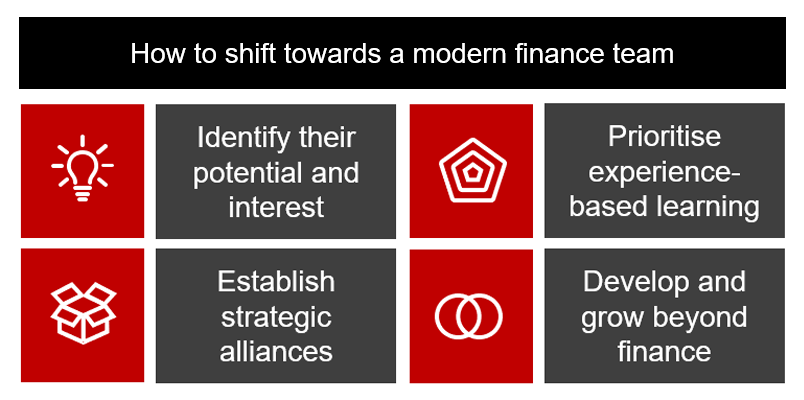{{item.title}}
{{item.text}}

{{item.text}}
30/09/21
Disruptive emerging technologies are accelerating transformation in finance functions, turning how companies detect fraud and make forecasts into value generators. The COVID-19 pandemic has been a key turning point in this revolution, as companies increased their pace of digitalisation via automation, artificial intelligence and data analytics to move to remote working, deploy cost-reduction programmes and meet the demand for real-time financial data to manage the impact of the crisis.
Digitalisation is more than just technology. Companies are realising that the right skills and capabilities are critical to the finance transformation journey. Based on PwC’s 2021 Finance Effectiveness Benchmarking Study conducted among finance leaders globally, they believe that five out of six steps to improve finance effectiveness hinge on people, one of the key reasons this has elevated the role of the modern finance team in finance transformation.
What does the modern finance team look like? According to the same 2021 benchmarking survey, the team comprises versatile finance professionals with a great variety of technical and commercial skills, who can easily toggle between roles and functions. A modern finance team does not focus on traditional and manual expertise like invoice processing or bottom-up forecasting; rather, it uses data and analytics to identify and monetise the company’s data assets. Some emerging roles within modern finance functions include finance business partners, data scientists, value managers and process owners.
When driving change in human capital, the first thing that comes to mind for CFOs is usually cost; and the perception is ‘investing in talent is an expensive exercise’. However, that doesn’t necessarily need to be the case. A Fortune 500 global tobacco company was able to generate a 53% uptick in productivity with no added technology or increases in headcount, through employee engagement and capability development in their finance shared services team. Although this took place pre-pandemic, the push for greater efficiency and impact is more important than ever, and the same principles apply. Modernising your finance team can help you prepare for the challenges of tomorrow.
Changing business models, industry convergence and regulatory shifts necessitate a transformation towards a finance team that is future-ready. It is important to recognise that a push for a modern finance team is necessary at this juncture. As we’ve seen over the past year, the pandemic has presented huge disruptions to how teams work and businesses function. Finance teams in traditional roles have not been spared of increasing challenges in executing their daily tasks.
We are also seeing the heightened importance and focus on environment, social and governance (ESG), where two thirds of institutional investors believe that ESG will become an industry standard in 5 years, according to a recent survey by Natixis Investment Managers. The finance function is at an important crossroads. Investing in a modern finance team will present the company a path forward for growth to stay competitive in the new normal. ESG adoption requires the finance function to perform multi-layered risk assessments in the areas of ESG in more detail. This exercise not only enhances the practice of good governance and compliance, it contributes to the long-term value creation of the company as a whole. The correlation between ESG and company performance has been promising - the MSCI World Socially Responsible Investing Index returns outperformed the MSCI World Index in 2020.
Based on PwC’s Global Culture Survey 2021, 86% of Malaysian respondents polled say that their organisation’s culture must evolve in the next three to five years for them to succeed, grow, and retain the best people. This raises an urgent question for CFOs: What do they need to do to encourage an effective transition towards a modern finance team?
Therefore, CFOs play a pivotal role in identifying their people’s potential and interests. With the emerging roles required within the finance function, CFOs can consider realigning their strategy to properly identify roles that play to their people's strengths. This involves matching them with responsibilities or tasks that bring out the best in them, and by extension the team. Employees whose interests align with their roles ought to perform better and will be able to bring in new ideas and innovation for improvements.
Top performing finance functions are keeping automation high on their agendas, but this is just the start of a bigger push for performance. In essence, people should be the utmost priority for a successful transformation journey. Learning to embrace the possibilities of technology and changes in behaviors and working culture will help bring your future finance function into the present. Underscored by agility, innovation and collaboration, your modern finance team can support successful and sustainable growth in a rapidly changing market.
{{item.text}}

{{item.text}}
{{item.text}}

{{item.text}}


